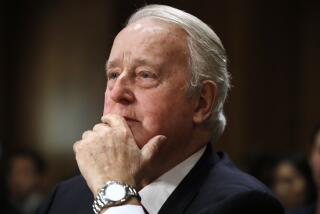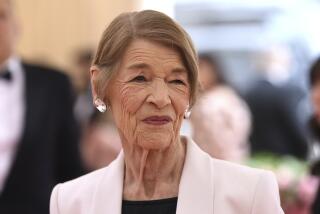Ex-British Prime Minister Harold Wilson Dies
- Share via
LONDON — Harold Wilson, the most successful Labor Party prime minister in British history, died in his sleep Wednesday at age 79.
Lord Wilson--who won four out of five general elections and was made a life peer in the House of Lords in 1983--had been out of the public eye for the past 10 years, reportedly suffering from Alzheimer’s disease. No specific cause of death was given.
He had been admitted to St. Thomas Hospital in London as a National Health Service patient, retaining his modest style to the end. His wife, Mary, said he died peacefully.
Prime Minister John Major said: “Over four decades, Harold Wilson was at the center of British public life. From the time of his appointment to the Cabinet at the remarkable tender age of 31, he served his country diligently and loyally.”
Tony Blair, the opposition Labor Party’s current leader, said that Wilson’s achievement was to end the party’s 13-year spell in the wilderness, when the Conservatives governed uninterrupted from 1951 to 1964, and bring “a deep sense of modern vision for the country.”
The product of a modest background in Yorkshire, James Harold Wilson attended Oxford University, where he became a lecturer in economics, and was elected to Parliament at 29. Two years later, he was raised to Prime Minister Clement R. Attlee’s Cabinet as president of the Board of Trade.
Wilson’s first national election victory came when he defeated the Conservatives under Prime Minister Alec Douglas-Home in 1964. He consolidated Labor’s narrow majority with a snap election two years later, gaining a comfortable parliamentary majority of almost 100 seats.
A pipe-smoking intellectual with a dry wit and a sharp debating style in Parliament, Wilson promised a new Britain, forged in the “white heat of technology.”
He was more interested in domestic than foreign policy, and strove to improve Britain’s creaky education and health services.
But his government was dominated by a long struggle to avoid devaluing the pound sterling--a battle that he eventually lost.
Though a moderate, Wilson constantly had to contend with left-wing labor union leaders and other militants within the Labor Party.
He kept British troops out of Vietnam while supporting President Lyndon B. Johnson in other policies.
Wilson was confident of success in the 1970 election but, in a major upset, lost to the Tories’ Edward Heath.
However, Wilson staged a comeback in 1974, regaining the prime minister’s job by a slender margin over Heath--whose administration was beset by, among other troubles, a miners strike and power shortages.
That same year, Wilson called another snap national election to strengthen his majority and succeeded in gaining 10 Downing Street for the fourth time.
During his stewardship, he brought famous Labor names into his Cabinet: Roy Jenkins, Shirley Williams, Roy Hattersley, Barbara Castle, Anthony Crosland, Tony Benn, Richard Crossman.
Wilson surprised the political world in the spring of 1976 by abruptly resigning--because, he said, he wished to leave active politics at a time of his own choosing.
He was succeeded by his deputy, James Callaghan, who lost the 1979 general election to the Conservatives’ Margaret Thatcher. She won the next two elections as prime minister and served until forced out by her own party in 1990.
Thus Wilson was prime minister longer than anyone this century except for now Baroness Thatcher.
Wilson was hailed as a sympathetic leader who helped modernize Britain, but his critics said he was a suspicious maneuverer who favored political hacks and promoted them into undeserved positions in his kitchen cabinet.
Lord Callaghan said Wednesday: “He was by nature a conciliator and the least self-assertive of men, but he fought with the doggedness and determination of a true Northerner when he had to. He was the most successful leader Labor has ever had.”
And Thatcher praised Wilson as “one of this country’s most skillful politicians and a superb parliamentarian. I always admired his wit and often appreciated his kindness. His death is a loss to all who knew him.”
More to Read
Sign up for Essential California
The most important California stories and recommendations in your inbox every morning.
You may occasionally receive promotional content from the Los Angeles Times.









